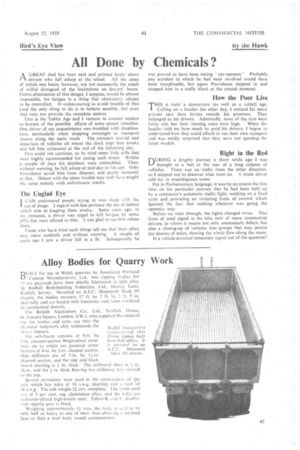All Done by Chemicals?
Page 39

If you've noticed an error in this article please click here to report it so we can fix it.
1-1 A GREAT deal has been said and printed lately about drivers who fall asleep at the wheel. All the cases of which one hears, however, are not necessarily the result of wilful disregard of the limitations on drivers' hours. Pritire elimination of this danger, I suppose, would he almost impossible, for fatigue is a thing that obstinately iefuses to be controlled. In endeavouring to avoid trouble of this kind the only thing to do is to behave sensibly, but even that may not provide the complete answer.
This is the Tablet Age and I venture to counsel readers CO beware of the possible effects of some patent remedies. One driver of my acquaintance was troubled with sleeplessness, particularly when stopping overnight at transport houses along the main roads The constant arrival and departure of vehicles all round the clock kept him awake and left him exhausted at the end of the following day.
This could not continue, so he tried some little pills that were highly recommended for easing such strain. Within a couple of days his slumbers were untroubled. Then, without warning, he fell asleep at mid-day in his cab. Only Providence saved him from disaster, and pretty narrowly at that. Others with the same trouble may well ha% e sought the same remedy with unfortunate results.
The Unglad Eye
I CAN understand people trying to woo sleep with the I aid of drugs. I regard with less patience the use of tablets which aim at keeping them awake. Some years ago, in my presence, a driver was urged to kill fatigue by some pills that were offered to him. I was glad to See him refuse them.
Those who have tried such things tell me that their effect may cease suddenly and without warning. A couple of years ago I saw a driver fall in a fit. Subsequently he was proved to have been taking " eye-openers." Probably any accident in which he had been involved would have been inexplicable, but again Providence stepped in and stopped him in a traffic block at the crucial moment.
How the Poor Live THIS is truly 'a democratic (as well as a tablet) age.
Calling on a haulier the other day, I noticed far more private cars than lorries outside his premises. They belonged to his drivers. Admittedly, most of the cars were fairly old, but their running costs were high. When the haulier told me how much he paid his drivers. I began to understand how they could afford to run their own transport and was mildly surprised that they were not sporting the latest models.
Right ill the Red
nURING a lengthy journey a short while ago I was
brought to a halt at the rear of a long column of vehicles. There was no traffic from the other direction, so I stepped out to discover what went on. A trunk driver told me in unambiguous terms.
Put in Parliamentary language, it was by no means the first time on his particular journey that he had been held up by a contractor's automatic traffic light, working on a fixed cycle and providing an irritating form of control which ignored the fact that nothing whatever was going the opposite way.
Before we went through, the lights changed twice. This form of road signal is the bete noir of many commercial drivers, to whom it means not only unnecessary delays, but also a closing-up of vehicles into groups that may persist for dozens of miles, slowing the whole flow along the route.
Is a vehicle-actuated temporary signal out of the question?




























































































